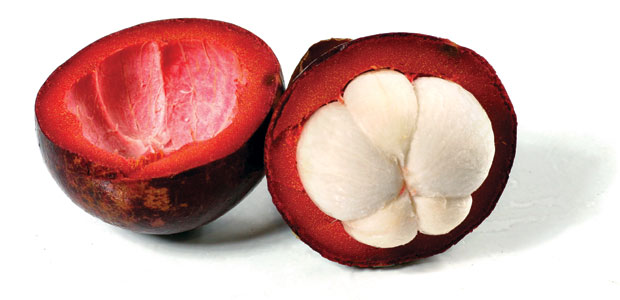Advertisement
Tropical Giants
Promising superfruits

You don’t have to trek through the Amazon rainforest to sample tropical superfruits. These power-packed giants, now available locally in many different forms, offer high levels of natural enzymes, vitamins, and antioxidant compounds.
Some of the promising superfruits currently being investigated for their potential healing ability include mangosteen, acai berries, camu berries, and goji berries.
Form and function
In their natural habitat these fruits are usually consumed fresh. They spoil so rapidly that it’s rare to find them fresh in North America. Be careful what form you choose; some processing methods employ heat to make concentrated forms. When heated, xanthones are stable and will not degrade, but vitamins and enzymes are more delicate and will be damaged or destroyed. Look for freeze-dried powder forms as well as frozen pulp products.
As with any food or supplement, it pays to do your research. Read the label’s information carefully as some products may contain ingredients other than the one you are seeking. Effects may vary from product to product according to serving levels and ingredients. Whenever possible seek out organically produced and fair trade versions.
Make sure to include these exciting fruits as part of a complete and healthy diet. In the end, remember that nothing speaks louder than results; be your own judge of how well superfruits perform for you.
Mangosteen
Where they grow: Found mainly in the jungles of Southeast Asia.
Why they matter: Mangosteens contain more types of xanthones (found mostly in the rind) than any other plant. Xanthones are biologically active plant phenols high in antioxidant properties that can help reduce the inflammation associated with many chronic health conditions.
The mangosteen is also very high in potassium, important for energy production and heart function. One important caution though: because the kidneys play an important part in clearing excess potassium from the body, those with kidney function concerns should exercise care in the consumption of mangosteen products.
How much to take: Consume 1 or 2 fluid ounces (30 to 60 mL) of mangosteen juice per day.
Acai berries
Where they grow: South America is the major source of acai berries.
Why they matter: Harvested from Amazonian palm trees, acai berries are high in antioxidant content, calcium, and vitamin A. They are also an excellent source of essential fatty acids, fibre, and protein. Early studies have pointed to their potential to induce apoptosis, the self-destruction of cancerous cells.
Due to intense media coverage around the possible health and weight-loss benefits of the acai berry, numerous forms are now available in the marketplace. Choose products made from skin and pulp only as the seeds contain little nutrient value.
How much to take: A regular serving of pure acai juice is about 1 fluid ounce (30 mL). Acai berries have a delicious flavour with notes of chocolate and berry fruit and make a great ingredient for smoothies.
Goji berries
Where they grow: Goji berries can be found in many places but are mainly cultivated
in China.
Why they matter: Goji berries have been a mainstay of Chinese medicine for centuries as an anti-inflammatory and liver support remedy. Recent studies point to the berry’s ability to support and protect eyesight against glaucoma and macular degeneration. Gojis have also demonstrated neuroprotective capabilities that could help fight the degenerative effects of Alzheimer’s disease.
How much to take: Aim to consume the equivalent of 10 to 30 grams of dried berries per day. Goji berries have a sweet, nutty flavour and are available powdered, as whole dried berries, and in juice form.
Camu camu
Where they grow: Found throughout South America but most common in Peru.
Why they matter: Camu camu (or camu berry) has one of the highest concentrations of bioavailable vitamin C of any food—up to 50 times more than oranges. Vitamin C, a powerful antioxidant and anti-inflammatory, supports the nervous system, boosts immune function, strengthens body tissues, and may help fight or prevent colds and influenza.
How much to take: Recommended daily intake in powder form is about 2 to 3 grams. Excess amounts of vitamin C can sometimes cause diarrhea. If this should occur, reduce your intake level.




